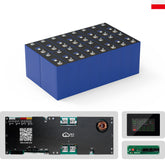Choosing Between Lithium-Ion and Lithium-Polymer Batteries
When you need to choose the best battery for your devices or tools, understanding the key differences between lithium-ion and lithium-polymer batteries is essential. These two battery types dominate the market due to their performance and reliability. Knowing their characteristics can help you make an informed decision and ensure your devices run optimally. Let's explore how to choose the best battery and what factors to consider for your specific needs.
- Understanding the Basics: How to Choose the Best Battery
- Why Choose the Best Battery for Your Needs?
- Benefits of Lithium-Ion Batteries: Why Choose This Battery?
- Benefits of Lithium-Polymer Batteries: Why Choose This Battery?
- Comparing Lithium-Ion and Lithium-Polymer Batteries: How to Choose the Best Battery
- How to Choose the Best Battery for Your Devices
- Tips for Maintaining the Battery You Choose
- Final Thoughts: Choose the Best Battery for Optimal Performance
Understanding the Basics: How to Choose the Best Battery
Before making a decision, it’s crucial to understand the fundamental differences between lithium-ion and lithium-polymer batteries. Each has unique strengths and is suited for different applications.
What Are Lithium-Ion Batteries?
Lithium-ion batteries are rechargeable batteries with a high energy density. They are widely used in consumer electronics, power tools, and electric vehicles. Their popularity stems from their long lifespan, lightweight design, and consistent performance.
What Are Lithium-Polymer Batteries?
Lithium-polymer batteries are another type of rechargeable battery, utilizing a polymer electrolyte. They are known for their lightweight and flexible designs, making them ideal for applications where size and weight are critical considerations.
Why Choose the Best Battery for Your Needs?
When you choose the best battery for your device, you ensure optimal performance, safety, and cost-effectiveness. Both lithium-ion and lithium-polymer batteries offer distinct advantages, so selecting the right one depends on your priorities.
>>See also A Comprehensive Overview Of Refrigerator Power Consumption
Benefits of Lithium-Ion Batteries: Why Choose This Battery?
High Energy Density
Lithium-ion batteries can store a significant amount of energy in a compact package, making them an excellent choice for devices that require long runtimes, such as laptops and power tools.
Long Lifespan
One of the main reasons to choose this battery type is its durability. Lithium-ion batteries last through many charge cycles, offering long-term value.
Consistent Performance
These batteries deliver steady power output throughout their discharge cycle, ensuring reliable performance for devices that demand consistent energy.
Quick Charging
Lithium-ion batteries are compatible with fast-charging technologies, reducing downtime and increasing convenience for users.
Benefits of Lithium-Polymer Batteries: Why Choose This Battery?
Lightweight and Compact
Lithium-polymer batteries are designed to be lighter and more compact than their lithium-ion counterparts. This makes them a top choice for portable devices like smartphones and drones.
Flexible Design
Their polymer construction allows for various shapes and sizes, enabling manufacturers to create innovative and ergonomic designs.
Safety Features
Lithium-polymer batteries have a reduced risk of leakage due to their solid-state electrolyte, making them a safer option for some applications.
Comparing Lithium-Ion and Lithium-Polymer Batteries: How to Choose the Best Battery
Energy Density
Lithium-ion batteries generally have a higher energy density, which is critical for applications requiring extended use. However, lithium-polymer batteries provide adequate energy storage for lightweight devices.
Durability
While both types are durable, lithium-ion batteries often have a longer lifespan. Lithium-polymer batteries, on the other hand, are more resistant to physical damage.
Cost
Lithium-ion batteries are typically more affordable due to their widespread production. However, if weight and size are critical, the additional cost of lithium-polymer batteries may be justified.
How to Choose the Best Battery for Your Devices
Consider Your Application
Evaluate what you need the battery for. Devices that require high power output and long runtimes often benefit from lithium-ion batteries, while lightweight and portable devices may perform better with lithium-polymer batteries.
Budget Constraints
If cost is a deciding factor, lithium-ion batteries are generally more cost-effective. However, for specialized uses, lithium-polymer batteries may offer advantages worth the investment.
Size and Weight Requirements
For applications where space and weight are limited, such as drones or wearable devices, lithium-polymer batteries are an excellent choice.
Usage Frequency
If you plan to use the device frequently, choosing a lithium-ion battery might be the better option due to its long lifecycle and high energy capacity.
Tips for Maintaining the Battery You Choose
Proper Charging Practices
- Avoid overcharging or fully depleting the battery to maximize its lifespan.
- Always use the recommended charger to ensure safety and efficiency.
Storage Guidelines
- Store batteries in a cool and dry place to prevent degradation.
- Keep them away from extreme temperatures, as heat or cold can affect performance.
Regular Use
- Even if not in use, charge and discharge the battery occasionally to maintain its health.
>>See also Is It Safe To Store Power Tool Batteries In The Garage
Final Thoughts: Choose the Best Battery for Optimal Performance
When deciding how to choose the best battery, consider your specific needs and priorities. Lithium-ion batteries offer superior energy density, durability, and cost-effectiveness, making them ideal for high-performance applications. Meanwhile, lithium-polymer batteries provide unmatched portability and design flexibility, perfect for lightweight devices.
By understanding the advantages and limitations of each battery type, you can make a well-informed choice. Ensure your devices and tools perform at their peak by selecting the battery that best suits your requirements. Choose the best battery and enjoy long-lasting, efficient performance every time.
























Leave a comment
All blog comments are checked prior to publishing